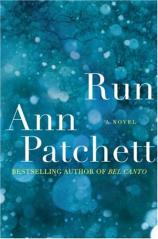Run
Review
Run
Detective stories and sonnets, Persian miniatures and minuets.
There is something enthralling to me about forms that impose
specific limits. What blooms within these walled gardens may
actually feel bigger and more intense than works that have whole
acres to play with.
This is the case with RUN, whose span is only a single day
(although the first chapter provides some necessary back story and
the last tells what happens four-and-a-half years later) and whose
characters are all associated in one way or another with the
Doyles, an Irish-American family in Boston: the father, a widower
and former mayor; one ne'er-do-well son, Sullivan; two
high-achieving adopted sons, Tip and Teddy, who happen to be
African American; and the boys' great uncle, a priest who may or
may not have healing powers. There is also a mother ("Tennessee
like the state") and her 11-year-old daughter, Kenya ("like the
country"), whose exact relation to the Doyles I mustn't reveal for
fear of ruining one of the novel's several surprises.
The collision of different sensibilities within the temporal
equivalent of a locked room reminded me a bit of Ann Patchett's
earlier fiction. In BEL CANTO, a disparate group is held hostage by
terrorists in an unnamed South American country; a home for unwed
mothers brings strangers together into a quasi-family in THE PATRON
SAINT OF LIARS. The web of accidental connections forms a
microcosm, a small world reflecting all the contradictions and
linkages of the larger one --- hardly an original device, but there
is nothing mechanical about the way Patchett applies it. She has
placed the thorns of race and class at the sensitive heart of her
book, and the result is painful but not without hope, a humanism so
pure and clear that it made me want to stand up and cheer.
Or cry. Or hold my breath. There is tremendous, wrenching tension
in Patchett's premise. As RUN begins, Tip is pushed out of the way
of an oncoming car by Kenya's mother. This simple act of
selflessness sends Tennessee to the hospital with serious injuries
while her daughter tumbles without warning, ALICE IN
WONDERLAND-style, into the Doyles' lives. As Kenya slowly feels out
her relationship to the family --- especially Tip and Teddy --- we
see her observing, with curiosity rather than rancor, that a
sameness of skin color doesn't mean a sameness of
circumstances.
After spending the night in the Doyles' house, Kenya can "do
nothing but take in the light. It had never occurred to her before
that all the places she had slept in her life had been dark, that
her own apartment had never seen a minute of this kind of
sun.… She wondered if there wasn't some way that light was
divided and somehow…more of it wound up in better
neighborhoods." Yet she and her mother live in a housing project
only three blocks away from this luminously clean, noiseless, sunny
paradise. And although Kenya is mysteriously and instinctively able
to connect with Tip over his passion for studying fish (there is a
riveting scene in Harvard's hushed subterranean ichthyology
department), she doesn't know who Henry Thoreau is and has never
been taken, like more privileged children, to visit Walden Pond.
She is "unable to shake off the feeling that it had all been a test
and that she had failed."
This innocent outsider --- loyal, eager to please, fearful of
making a mistake, full of heartbreaking self-possession and dignity
--- is the crux of the book; she and her mother become a sort of
crucible for the Doyles, testing and transforming the family. Kenya
is a character so palpable, down to her carefully parted hair and
six ponytails, that she seems on the verge of bursting out of the
pages. Her talent, it turns out, is for running (hence the book's
title); when Tip takes her to Harvard's indoor track, she virtually
explodes: "Anger and sadness and a sense of injustice that was
bigger than any one thing that had happened stoked an enormous fire
in her chest and that fire kept her heart vibrant and hot and
alive, a beautiful, infallible machine."
RUN is all about people trying to outstrip their destiny. The elder
Doyle and Tennessee, both single parents, seem determined to make
their kids into moral paragons and future leaders, thinking to
protect them from racism and powerlessness. They invest
considerable passion in politics (giving the word run a
different significance) --- which, Patchett makes clear, has the
ability to corrupt (a scandal in Sullivan's past is hushed up by
his father) as well as to inspire (in a flashback, after hearing
Dr. King speak, Tennessee, stunned, realizes that "[t]here were
some people who had the ability to tell other people what was worth
wanting, could tell them in a way that was so powerful that the
people who heard them suddenly had their eyes opened to what had
been withheld from them all along").
But Patchett also seems to be saying that rational attempts to
control your destiny will take you only so far. I don't mean that
she comes across as mystical, despite some spooky moments (a
ghostly encounter between Tennessee and a friend from the past);
the faith she expresses is secular rather than conventionally
religious --- something more like fate, karma, or providence, which
turns accident into intention and bad luck into a blessing of
sorts.
A book this good --- and I mean decent, not just skillfully written
--- doesn't come along every day. Forgive the pun, but run, don't
walk, to get your hands on a copy.
Reviewed by Kathy Weissman on April 27, 2011
Run
- Publication Date: September 25, 2007
- Genres: Fiction
- Hardcover: 304 pages
- Publisher: Harper
- ISBN-10: 0061340634
- ISBN-13: 9780061340635





